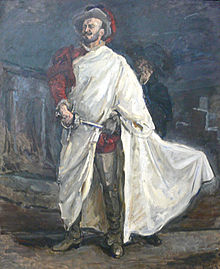 Classical Music Milestone - October 17
Classical Music Milestone - October 17
The music of the ballet Don Juan composed by Christoph Willibald von Gluck premieres successfully on October 17, 1761, in Vienna, Austria, at the Theater am Kärntnertor. The ballet follows the legend of Don Juan and his descent into Hell after killing his inamorata's father in a duel. Don Juan ou Le Festin de Pierre (Don Juan, or the Stone Guest's Banquet) is a ballet with a libretto by Ranieri de' Calzabigi, and choreography by Gasparo Angiolini.
Don Juan is used synonymously to mean a "womanizer", especially in Spanish slang.
The Plot of Don Juan
Ballet setting: Madrid, SpainThe overture is a short sonata form sinfonietta in which the recurring motif of threatening trumpets plays a prominent part.
Act 1.
Don Juan serenades Donna Elvira beneath her balcony. Her father, the Commander enters with sword drawn to protect his daughter. In the duel that followed, Don Juan wounds the Commander, who rallies, attacks, then faints and dies.
Act 2.
Don Juan has prepared a banquet for his friends. Dances include a gavotte, contredanse, minuet, and fandango. A terrific knocking is suddenly heard at the door. Don Juan's servant provides comic relief as he scurries back and forth to the door. When Don Juan finally opens the door, he discovers the marble statue of the dead Commander. He invites the Commander to dinner, but the statue invites Juan to dine at his tomb then departs.
Act 3.
The setting is in a graveyard where Don Juan rushes in accompanied by the shivers of the orchestral music. The Commander steps from his tomb to a stately minuet and scolds Juan accompanied by echoes of the dinner invitation. Juan confronts the Commander with vanity, and courage. The climax is reached when irrevocable judgment is passed upon Don Juan. To the accompanying strains of an ominous passacaglia, graves open, flames rise, and Don Juan sinks to hell.
Trivia: Don Juan (a Spanish name or "Don Giovanni" in Italian) is a legendary, fictional libertine whose story has been told many times by many authors. Considered the most influential version of all is Don Giovanni (the Italian for "Juan") composed by Wolfgang Amadeus Mozart, libretto by Lorenzo da Ponti, which was first performed in Prague in 1787.
Video Image:
Christoph Willibald Gluck: Don Juan Suite (Auszüge). Youtube, uploaded by Westfälische Kammerphilharmonie Gütersloh. Accessed October 17, 2013.
Resources:
Image Credit:
Don Juan in Mozart's opera Don Giovanni, a painting by Max Slevogt. Wikimedia Commons, Accessed October 17, 2013.
(c) October 2013. Tel. Inspired Pen Web. All rights reserved.
Video Image:
Christoph Willibald Gluck: Don Juan Suite (Auszüge). Youtube, uploaded by Westfälische Kammerphilharmonie Gütersloh. Accessed October 17, 2013.
Resources:
- Kant, Marion (2007), The Cambridge Companion to Ballet, Cambridge and New York: Cambridge University Press.
- Kirstein, Lincoln (1984), Four Centuries of Ballet: Fifty Masterworks, New York.
Image Credit:
Don Juan in Mozart's opera Don Giovanni, a painting by Max Slevogt. Wikimedia Commons, Accessed October 17, 2013.
(c) October 2013. Tel. Inspired Pen Web. All rights reserved.

No comments:
Post a Comment